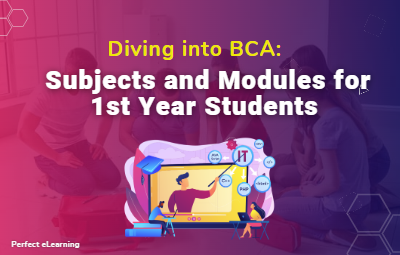

BCA is an undergraduate degree program designed to equip students with comprehensive knowledge and practical skills in computer applications. It offers an interdisciplinary curriculum that combines computer science, information technology, and business management. The program focuses on providing students with a solid understanding of the fundamental principles and practices in various areas of computer science.
1. Overview of the BCA curriculum
The BCA curriculum is carefully designed to provide students with a comprehensive understanding of various aspects of computer science. In the first year of the program, students are introduced to a range of subjects and modules that form the foundation of their BCA journey.
2. Understanding programming fundamentals
One of the key subjects in the first year of BCA is programming fundamentals. Students learn the basics of programming languages, including syntax, variables, control structures, and functions. They are exposed to different programming methodologies and concepts, such as procedural programming, object-oriented programming, and event-driven programming.
3. Database management systems
Another important subject in the first year is database management systems. Students learn the fundamentals of databases, including data modeling, normalization, and SQL queries. They also gain hands-on experience with popular relational database management systems, such as MySQL and Oracle.
4. Data structures and algorithms
Data structures and algorithms form the building blocks of efficient software development. In this subject, students learn about various data structures, such as arrays, linked lists, stacks, queues, trees, and graphs. They also study essential sorting and searching algorithms, enabling them to solve complex computational problems.
5. Computer networks and communication
In an interconnected world, understanding computer networks and communication is crucial. This subject introduces students to the fundamentals of computer networks, including network topologies, protocols, and network security. They also learn about emerging technologies like cloud computing and Internet of Things (IoT).
6. Web development and design
Web development is an essential skill in today's digital landscape. Students are introduced to web technologies such as HTML, CSS, and JavaScript. They learn how to create interactive and visually appealing web pages and gain an understanding of web development frameworks and content management systems.
7. System analysis and design
System analysis and design focuses on the process of developing efficient software solutions. Students learn about the software development life cycle, including requirement analysis, system design, implementation, testing, and maintenance. They also gain knowledge of various software development methodologies, such as waterfall and agile.
8. Mathematics for computer science
Mathematics plays a crucial role in computer science. In this subject, students study discrete mathematics, which forms the foundation for algorithms and cryptography. They also explore probability and statistics, which are essential for data analysis and decision-making.
9. Computer organization and architecture
Computer organization and architecture provide an understanding of the internal workings of computers. Students learn about basic computer components, memory organization, instruction set architecture, and computer arithmetic. They gain insights into the factors that influence computer performance.
10. Operating systems
Operating systems are the backbone of computer systems. Students learn about the various functions of an operating system, including process management, memory management, file systems, and device management. They also gain hands-on experience with operating system concepts through practical assignments.
11. Introduction to software engineering
Software engineering focuses on the systematic development of high-quality software. Students learn about software development methodologies, such as the waterfall model, iterative model, and agile methodologies. They also gain an understanding of software testing techniques and quality assurance processes.
12. Soft skills development
Apart from technical knowledge, soft skills are essential for professional success. BCA programs often include modules to develop students' communication and presentation skills, teamwork abilities, leadership qualities, and problem-solving capabilities. These skills help students effectively collaborate with colleagues and clients in the industry.
Conclusion
The first year of a BCA program sets the stage for students to explore the exciting world of computer science. Through a well-rounded curriculum that covers programming fundamentals, database management systems, data structures and algorithms, computer networks and communication, web development, system analysis and design, mathematics for computer science, computer organization and architecture, operating systems, introduction to software engineering, and soft skills development, students gain a strong foundation in various areas of computer applications. This foundation prepares them to tackle more advanced subjects in the following years and equips them with the necessary skills to excel in the dynamic field of computer science.
FAQs
Q. What is BCA?
A. BCA stands for Bachelor of Computer Applications. It is an undergraduate degree program that focuses on computer science and applications.
Q. What are the career prospects after completing a BCA degree?
A. BCA graduates have various career opportunities, including software development, database administration, system analysis, web development, network administration, and IT consulting.
Q. Is BCA equivalent to a B.Tech degree in computer science?
A. While BCA and B.Tech in computer science share some common subjects, B.Tech is typically more focused on technical aspects and has a broader scope.
Q. Can I pursue an MBA after completing BCA?
A. Yes, after completing BCA, you can pursue an MBA with a specialization in information technology or systems management to enhance your managerial skills.


